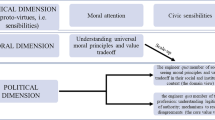Abstract
Engineering educators have long discussed the need to teach professional responsibility and the social context of engineering without adding to overcrowded curricula. One difficulty we face is the lack of appropriate teaching materials that can fit into existing courses. The PRiME (Professional Responsibility Modules for Engineering) Project (http://www.engr.utexas.edu/ethics/primeModules.cfm) described in this paper was initiated at the University of Texas, Austin to provide web-based modules that could be integrated into any undergraduate engineering class. Using HPL (How People Learn) theory, PRiME developed and piloted four modules during the academic year 2004–2005. This article introduces the modules and the pilot, outlines the assessment process, analyzes the results, and describes how the modules are being revised in light of the initial assessment. In its first year of development and testing, PRiME made significant progress towards meeting its objectives. The PRiME Project can strengthen engineering education by providing faculty with an effective system for engaging students in learning about professional responsibility.
Similar content being viewed by others
References
Davis, M. (2004) Teaching ethics across the engineering curriculum. The Online Ethics Center for Engineering and Science, Case Western Reserve University.
Whitbeck, C. (2003) Undergraduate education in practical ethics. The Online Ethics Center for Engineering and Science, Case Western Reserve University.
Herkert, J. (1999) ABET’s engineering eriteria 2000 and engineering ethics: where do we go from here? OEC International Conference on Ethics in Engineering and Computer Science, March: http://onlineethics.org/essays/education/index.html.
Steneck, N. (1999) Using the web for teaching engineering ethics across the curriculum. OEC International Conference on Ethics in Engineering and Computer Science, March: http://onlineethics.org/essays/education/index.html.
Grose, T. (2004) Opening a new book. Prism. Feb. Retrieved Sept. 29, 2005 from http://www.prism-magazine.org/feb04/new_book.cfm.
Bransford, J.D., Brown, A., and Cocking, R.R., eds. (2000) How People Learn: Brain, Mind, Experience, and School. National Academy Press, Washington, D.C.
Martin, T., Rayne, K., Kemp, N.J., Hart, J., and Diller, K.R. (2005) Teaching for adaptive expertise in biomedical engineering ethics. Science and Engineering Ethics 11/2: 257–276.
Hart, H. and Randall, D. (2005) PRiME: Designing challenge-based ethics instruction for undergraduate engineers, Proceedings of the IPCC Conference, Limerick, Ireland, July.
Bransford, J.D. (1998) Designing Environments to Reveal, Support, and Expand our Children’s Potentials, in: Soraci, S.A. and McIlvane, W., eds. Perspectives on Fundamental Processes in Intellectual Functioning, vol. 1, Greenwich, CT, Ablex: 13–50.
Moore, O.C.; Nichols, S.P.; and Bird, S.J. (2005). The PRiME project: developing educational materials to train responsible engineers. Proceedings of the 2005 ASEE Annual Conference, Portland, OR.
Randall, D. and Hart, H. (2005) Whose words can we trust?: PRiME’s modules for teaching and assessing undergraduate learning in information ethics. Proceedings of the 2005 ASEE Annual Conference, Portland, OR.
Moore, C. (2005). The PRiME project: web-based material on engineering ethics and professional responsibility., Proceedings Of The International Conference On Engineering Education And Research. Gliwice, Poland, International Network of Engineering Educators and Researchers, July 25–29, 2005.
Moore, C. and Koen, B. (2005) Using the engineering method to research and write about corporate practice. Proceedings of the 2005 ASEE Annual Conference & Exposition, Portland, OR.
Herkert, J. (1997) Making connections: engineering ethics on the World Wide Web. IEEE Transactions on Education, Institute of Electrical and Electronics Engineers, November. Reprinted, with permission, at: http://onlineethics.org/essays/education/herkert.html,
Boston, C. (2002). The concept of formative assessment. Practical Assessment, Research & Evaluation, 8(9). Retrieved September 22, 2005 from http://PAREonline.net/getvn.asp?v=8&n=9.
Weitz, R. (2005). Teaching about Hurricane Katrina: Resources for Faculty (and Students). Retrieved September 28, 2005 from http://www.public.asu.edu/~yma14/Katrina/Overviews.htm
Author information
Authors and Affiliations
Corresponding author
Rights and permissions
About this article
Cite this article
Moore, C., Hart, H., Randall, D. et al. PRiME: Integrating professional responsibility into the engineering curriculum. SCI ENG ETHICS 12, 273–289 (2006). https://doi.org/10.1007/s11948-006-0027-6
Received:
Revised:
Accepted:
Issue Date:
DOI: https://doi.org/10.1007/s11948-006-0027-6



